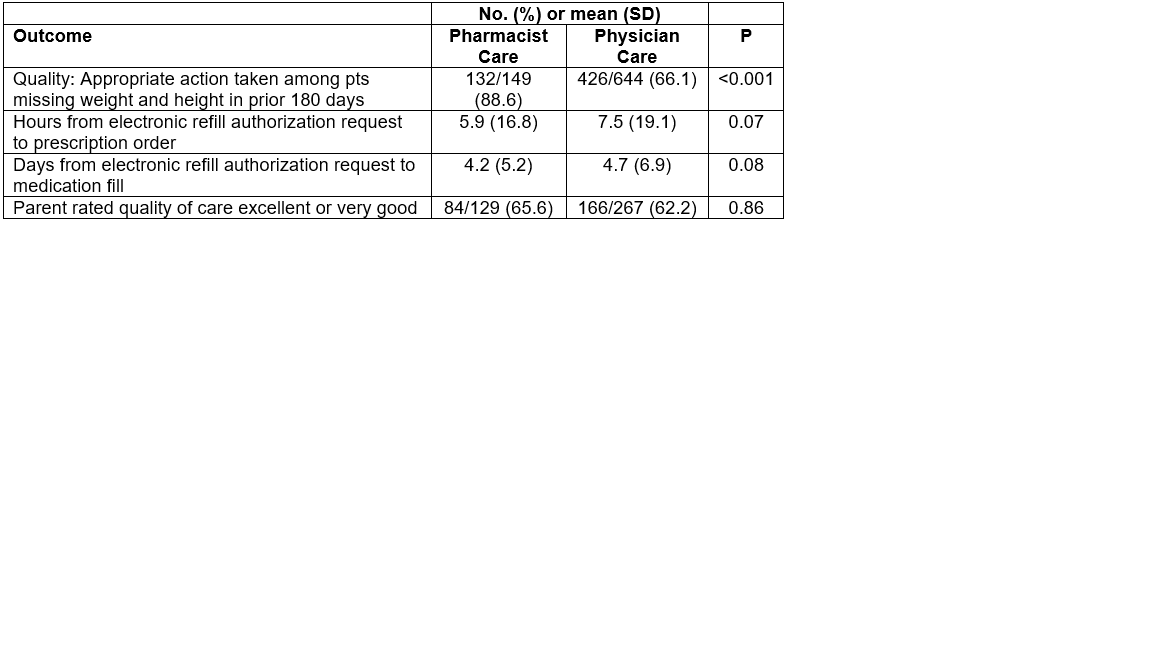Technology 2: Telemedicine
Session: Technology 2: Telemedicine
192 - Pharmacist Management of Attention Deficit Hyperactivity Disorder Medication Electronic Refill Requests
Saturday, April 26, 2025
2:30pm - 4:45pm HST
Publication Number: 192.6257
Tracy A. Lieu, Kaiser Permanente Northern California and JAMA, Piedmont, CA, United States; Daniel Parry, The Permanente Medical Group, San Rafael, CA, United States; Andrew deLaunay, Kaiser Permanente - Oakland Medical Center, Oakland, CA, United States; E. Margaret Warton, Kaiser Permanente Division of Research, Pleasanton, CA, United States; Stephanie Prausnitz, Kaiser Permanente Northern California, Pleasanton, CA, United States; Omar Ahmed, Kaiser Permanente - Oakland Medical Center, San Rafael, CA, United States; Michelle R. Mancha, Kaiser Permanente - Oakland Medical Center, Fremont, CA, United States; Eric Smallberg, The Permanente Medical Group, Pleasanton, CA, United States; Charles Quesenberry, Kaiser Permanente Northern California, Pleasanton, CA, United States; Kristine Lee, Kaiser Permanente, Pleasanton, CA, United States; Mary Reed, Kaiser Permanente Division of Research, Kaiser Permanente Bernard J. Tyson School of Medicine, Pleasanton, CA, United States

Dan Parry, MD
Regional Medical Director - Desktop Medicine
The Permanente Medical Group
San Rafael, California, United States
Presenting Author(s)
Background: During the COVID-19 pandemic, the federal government created a temporary special flexibility to allow clinicians to prescribe refills of controlled substances including ADHD medications via telemedicine, rather than requiring visits in person. Parents can currently request ADHD medication refills via electronic secure messages, but this and ADHD medication shortages have increased e-inbox workload for pediatricians. Pharmacist management of refill requests could help, but scant information exists on its effectiveness.
Objective: To compare pharmacist management of electronic ADHD medication refill requests with physician management regarding quality of care, timeliness of service, and parent satisfaction.
Design/Methods: This cluster randomized clinical trial included patients of 63 medical facilities of Kaiser Permanente Northern California who made electronic refill authorization requests for ADHD medication from May 14 to June 21, 2024. In the Pharmacist Care group, a regional team of pharmacists managed refill requests; in the Physician Care group, pediatricians managed them. The primary outcome was a quality measure among patients without a weight and height recorded within 180 days before the refill request, counted as present when the clinician attempted to collect a weight and height or arrange a future in-person appointment. Secondary outcomes were timeliness of the prescription order and fill, and parent ratings of care.
Results: Among the 2442 eligible patients, 512 had Pharmacist Care and 1930 had Physician Care. Overall, 793 patients were eligible for evaluation of the primary outcome. Of these, 88.6% with Pharmacist Care and 66.1% with Physician Care met the quality measure (aRR, 1.33; 95% CI, 1.22-1.43; p< 0.001). The Pharmacist and Physician Care groups had similar times from the refill request to the prescription order (5.92 vs 7.48 hours) and to the medication fill (4.18 vs 4.69 days). Of 396 parent respondents (68% response rate), ratings of quality of care were similar between the Pharmacist and Physician Care groups (65.6% vs. 62.2% rated excellent or very good). The vast majority of parents (389, or 98.5%) preferred to make refill requests via secure message or an electronic pharmacy application, rather than a phone or in-person visit.
Conclusion(s): Pharmacist management of electronic refill requests for ADHD medications yielded higher quality of care and similar timeliness and parent ratings of care as physician management. Parents indicated very strong preferences to continue seeking such refills via telemedicine prescribing.
Table. Quality, timeliness, and parent ratings of electronic refill authorization requests for attention deficit hyperactivity disorder medications with Pharmacist Care vs Physician Care, Kaiser Permanente Northern California, 2024


